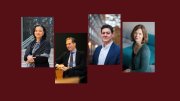Alan M. Garber, interim president since January 2, and John F. Manning, interim provost since March 14, today announced a pair of University-wide working groups. The “Institutional Voice Working Group” will consider when and if Harvard should take public positions on political issues. The “Open Inquiry and Constructive Dialogue Working Group” will examine how the University can foster civil discourse on campus.
When Garber named Manning interim provost last month, he tasked Manning with tackling both institutional voice and civil discourse. After Harvard’s wavering statements following Hamas’ October 7 terrorist attack on Israel initiated campus chaos, the University began to consider adopting a position of institutional neutrality (first reported by the Harvard Crimson). And after a fall of convulsive campus protests, this spring, the University has focused on fostering respectful disagreement. The College hosted an undergraduate civil discourse summit, and the Kennedy School released a thorough analysis of its speech climate.
In their initial announcement, Garber and Manning appointed a pair of professors to lead the Institutional Voice Working Group: Frankfurter professor of law Noah Feldman and Wolcott professor of philosophy Alison Simmons. The group, the announcement says, will “recommend concrete answers to questions such as: Should the University make official, institutional declarations about matters of social and political significance? Who is authorized to speak for the University on these issues, and how?” Some of these issues were debated at a recent Radcliffe Institute forum, reported here.
The Open Inquiry and Constructive Dialogue Working Group will be led by Eric Beerbohm, director of the Safra Center for Ethics and faculty dean of Quincy House, and Radcliffe Dean Tomiko Brown-Nagin. Both have already worked on leading difficult conversations, Beerbohm as the Faculty of Arts and Sciences’ senior adviser on civil discourse, and Brown-Nagin through her role at Radcliffe. Garber and Manning say this group will examine “how to foster engagement across differing viewpoints as we teach, learn, and interact more broadly with one another throughout the University.”
Garber and Manning write that these groups are “critical to the success of Harvard’s mission of teaching, learning, and research,” and continue:
Success in pursuing this core mission is dependent on free, open, and constructive discourse among the University’s many members. Excellence in discovery and learning requires the ability to advance ideas and explore them fully, to challenge accepted wisdom, to disagree productively, and to recognize that we will often make mistakes as we learn. It is the University’s unwavering commitment to academic freedom and the free exchange of ideas that makes all of this possible.
The full task force memberships are detailed here.








